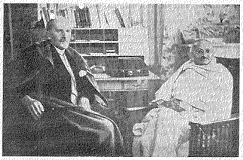Meanwhile Gandhi was, as he put it, "doing
the real round table work, getting to know the people of England". He had accepted
Muriel Lester’s invitation to stay in Kingsley Hall in the East end, in order to be
"among the same sort of people to whom I have given my life" Every morning the
light appeared in his room at four for the morning prayer. He had his morning walk in the
main streets of the East End; he visited his neighbours in Bow; he made friends with the
children. "Uncle Gandhi" became a popular figure. He explained to the children
why he had chosen to stay in the East End and why he wore his meagre dress. He advised
them to return good for evil. There was an interesting sequel to this advice, when the
father of a four-year-old girl told the Mahatma that he had a bone to pick with him.
"And what is it?" asked Gandhi. "Well my little Jane comes every morning to
me, hits me and wakes me up and says: Now, don’t you hit back, for Gandhi told us not
to hit back". On October 2, Gandhi’s birth day, the children presented him with
‘two woolly dogs, three pink birthday candles, a tin plate, a blue pencil and some
jelly sweets’—gifts which he especially treasured and took to India. One of the most pleasant surprises of the tour was the courtesy and even affection Gandhi received from the cotton operatives of Lancashire, which had been hit the hardest by the boycott of British goods in India. He listened with obvious attention and sympathy to the tale of woe of those who were jobless. Many of them saw the background of the boycott which he had sponsored, when he told them: "You have three million unemployed, but we have200 million unemployed for half the year. Your average unemployment dole is seventy shillings. Our average income is 7s. 6d. a month." Gandhi’s homely logic and transparent sincerity left an indelible impression on some of those whom he met. They formed clearer impressions of him than the loin cloth and goat’s milk version with which the popular press regaled them. While his opinions might appear utopian or revolutionary, he could no longer be dismissed as "humbug", the appellation with which Truth had heralded his arrival in England. Meanwhile, the news from India had been far from reassuring. The compromise which had been patched up between the Congress and the Government before Gandhi’s departure for England had virtually broken down. Gandhi was anxious to return home; he declined invitations to prolong his itinerary in Europe and to visit America, but he decided to spend a few days in Switzerland with his biographer, Romain Rolland. In Rome, where he spent a day, he walked through the Vatican galleries; in the Sistine Chapel he was spell-bound: "I saw a figure of Christ there. It was wonderful. I could not tear myself away. The tears sprang to my eyes as I gazed." |
